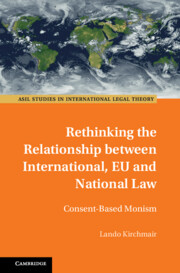Book contents
- Rethinking the Relationship between International, EU and National Law
- ASIL Studies in International Legal Theory
- Rethinking the Relationship between International, EU and National Law
- Copyright page
- Contents
- Figures and Tables
- Preface
- Acknowledgments
- Table of Cases
- Abbreviations
- Introduction
- Part I Common Theories on the Relationship of Legal Orders and Their Flaws Concerning the EU Legal Order
- 1 Dualism and Kelsenian Monism
- 2 Global Legal Pluralism and Constitutionalism
- 3 The “Autonomy” of the EU Legal Order as a Self-Standing Theory?
- 4 An Intermediate Conclusion
- Part II Consent-Based Monism
- Part III A Practical Application of Consent-Based Monism
- Conclusion
- Bibliography
- Index
1 - Dualism and Kelsenian Monism
from Part I - Common Theories on the Relationship of Legal Orders and Their Flaws Concerning the EU Legal Order
Published online by Cambridge University Press: 29 February 2024
- Rethinking the Relationship between International, EU and National Law
- ASIL Studies in International Legal Theory
- Rethinking the Relationship between International, EU and National Law
- Copyright page
- Contents
- Figures and Tables
- Preface
- Acknowledgments
- Table of Cases
- Abbreviations
- Introduction
- Part I Common Theories on the Relationship of Legal Orders and Their Flaws Concerning the EU Legal Order
- 1 Dualism and Kelsenian Monism
- 2 Global Legal Pluralism and Constitutionalism
- 3 The “Autonomy” of the EU Legal Order as a Self-Standing Theory?
- 4 An Intermediate Conclusion
- Part II Consent-Based Monism
- Part III A Practical Application of Consent-Based Monism
- Conclusion
- Bibliography
- Index
Summary
This chapter critically reviews dualism, as developed by Heinrich Triepel, and monism, mainly formulated by Hans Kelsen. It argues that these theories can no longer comprehensively explain the relationship between international and EU or EU and national law and that, due to their emergence almost a century ago, these theories must be understood in their historical context. Historically, dualism was progress as the separation of international and national law helped international law become independent. Thus, dualism liberated international law from being understood as “external State law,” and was even referred to as a “cleansing thunderstorm” by the monist Alfred Verdross. The main characteristic of monism is the assumption of a single unified legal system. Kelsenian monism must face the criticism of having a highly fictitious understanding of the world: nothing less than the “unity of the legal world order” is proclaimed. To depict the most important assumptions of Kelsenian monism, this chapter looks into the Kelsenian adherence to neo-Kantian epistemology, and shows that this understanding refers to a very specific philosophical position, which has been rightly criticized by many philosophers.
Keywords
- Type
- Chapter
- Information
- Rethinking the Relationship between International, EU and National LawConsent-Based Monism, pp. 11 - 58Publisher: Cambridge University PressPrint publication year: 2024

